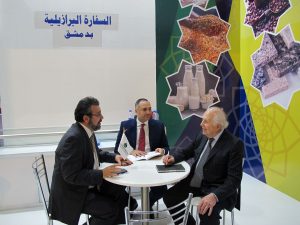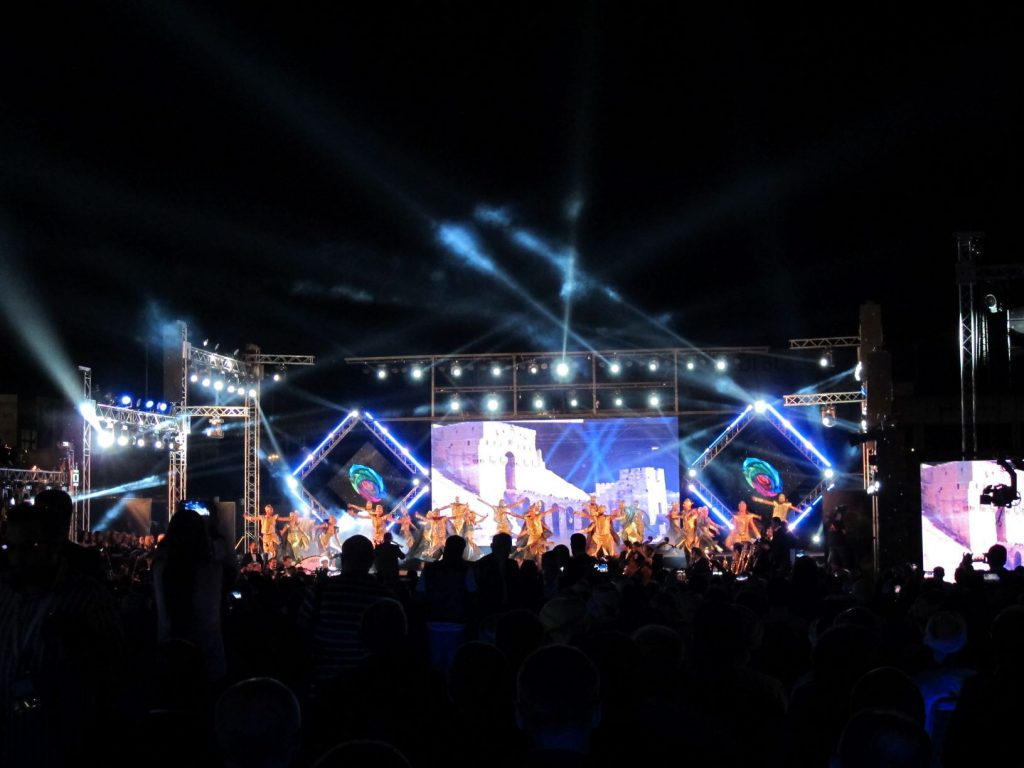Damascus – The opening ceremony of the 61st Damascus International Fair was held this Wednesday evening (28) at the exhibition center in the Syrian capital. The event opens for the general public on Thursday (29). The Brazilian participation in the event was organized by the Arab Brazilian Chamber of Commerce and the Embassy of Brazil in Syria.

“The fair features the strongest international participation since its first edition, in 1954, which had 48 countries,” said Arab Chamber secretary-general Tamer Mansour, who attended the opening along with board chairman Walid Yazigi and director Sami Roumieh.
Mansour pointed out that several Arab countries are featured, including the UAE, Saudi Arabia, Oman, Jordan and Egypt. “This goes to show that the Arab world is setting its sights on Syria again as a potential market for exports, imports, and investment,” he said.
The annual multi-industry fair – which had been put on hold since the civil war broke out in 2011 – resumed in 2017. “ Brazil has been joining the fair since it resumed. The country and the Arab Chamber are present,” said Brazil’s ambassador to Damascus, Fabio Vaz Pitaluga, who was in attendance, as was the Embassy’s minister-counselor Luiz Felipe Rosa Santos.
Brazil’s stand sits along Pavilion 10, and activities there are handled by Arab Chamber events coordinator Tâmara Machado. Visitors can get information on Brazil and state their needs, which will be relayed to Chamber member companies. Samples from Brazilian marble and granite Imetame are on display.
“The Arab Chamber’s being here is a positive thing. The Syrians are certainly very glad to have us (Brazilians) here,” said Pitaluga. Mansour thanked the Embassy for the partnership. “The Embassy has once again brought in the Brazilian flag, alongside the Arab Chamber, to show Syrian businesspeople how relevant Syria is to Brazilian companies,” he asserted.
The ambassador remarked that Brazil-Syria bilateral trade peaked in 2010, prior to the war, with sales amounting to nearly USD 600 million. That was the year Syria’s president Bashar Al Assad visited Brazil. Since then, deals plummeted to slightly over USD 60 million last year, the bulk of which were coffee and sugar exports from Brazil.

“Our business owners are still in talks, trade is still happening, they are finding ways to stay in touch. First-half (of 2019) numbers show a modest increase,” said Pitaluga. H1 saw USD 37 million in bilateral trade, up 18.5% year-on-year, as per Arab Chamber figures.
The diplomat also said that Brazil is interested in playing a part in the rebuilding of Syria, and that Syrians consider it a friendly country, hence the importance of Brazilian enterprises making their presence felt early on in this process. According to him, Brazil is deemed a priority partner in this regard. He went on to say that a new investment law is about to get passed, in a bid to bring in foreign and local investors.
Show

Prime minister Imad Khamis delivered the opening address on behalf of the Syrian government. Sami Roumieh stressed that Khamis invited Arab and international businesses to invest in Syria, and said the country is open to doing business.
The event included music and dance performances from Syria and countries like China, Iran and Russia, as well as footage and images from past and current editions, tied up into a story that mimicked a conversation between a grandfather and grandson.
“This international fair opened with a show that looked like an apotheosis, with lighting and sound effects inspired in the Cirque du Soleil. The theme was the [ancient] Silk Road, which Chinese merchants used to take to Damascus, going through India, Iran and Russia. It used to be located at the threshold between East and West,” explained Walid Yazigi.

The pictures and videos from past editions showcased appearances in the Fair by highly popular artists from across the Arab world, such as the female singers Umm Kulthum, of Egypt, and Sabah, of Lebanon, and male singers Abdel Halim Hafez, of Egypt, Fahd Bellan and Sabah Fakhiri, of Syria.
“We witnessed how that opening video touched people’s hearts. This was the first international fair in the Middle East and the Arab world, and it cemented its status as a pioneer,” said Roumieh. He noted that the event combines trade and culture, and that the Wednesday evening show is a “privilege” in light of the “events that unfolded in the last few years of this crisis” in the country.
“Trade and culture conflate in the history of this fair, and this is one of the things that set it apart,” he said. “And in the end they conveyed a message of peace from Damascus to the world,” he went on. From Damascus to the World is the slogan for this edition.
*ANBA is reporting from Damascus at the invitation of Syria’s Ministry of Tourism




